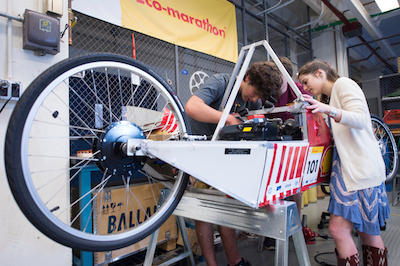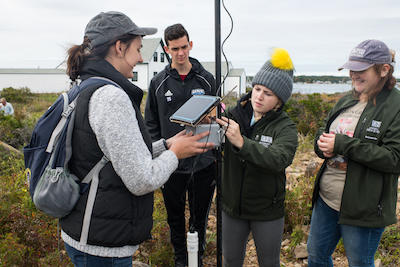Presented by Our Partner Schools
Finding a Green College is important for many of today’s students, especially if they want to explore green majors or pursue environmental-related careers. In fact, 63% of students who took the 2018 " Colleges Hopes & Worries Survey " said having information about a college's commitment to the environment would influence their decision to apply to or attend the school.
If you want to make educated and informed choices about attending schools with a Green focus, or prepare yourself for a green career, consider the advice from these schools as you explore green majors or areas of focus at green colleges.
A Range of Options: Explore Green Majors
Students that explore green majors often end up in fields within Environmental Studies and Sustainability, and many look for ways to connect them to fields like law, biology, and other areas.
Co-Op Programs and Research
The University of Arizona’s environmental commitment is evident in numerous degrees of study and campus life as a whole. With environment and sustainability-focused degrees across engineering, law, architecture, science, agriculture, public health and social science, programs range from critical water management to planning whole cities and modeling climate patterns. Known for its environmentally sound architecture and landscaping and considered a living arboretum, UA’s campus is also home to two LEED platinum dormitories and rec center, a rooftop greenhouse and garage-top solar arrays.
 The Biosphere at the University of Arizona
The Biosphere at the University of Arizona Design Your Own
In addition to offering an environmental studies major since 1992, Swarthmore College allows students to choose their own core focus, such as sustainable food systems or environmental politics, within this interdisciplinary major. Students also have the option to major in biology with a focus on environmental biology, taking courses such as Ecology and Conservation Biology. Swarthmore provides a Design Your Own Major path, which enables students to tailor their studies on an individual level. Recent examples include: sustainable development studies, environmental theory and action, and environmental governance and social change.
 Swarthmore students work on a fuel cell car.
Swarthmore students work on a fuel cell car. Commitment to the Environment In and Out of the Classroom
In addition to exploring the range of majors and areas of focus, be sure to examine the institution’s commitment to sustainability, or, how their physical location lends itself to studies and practices in this area.
Consider Location and Hands On Learning
Programs like the University of New England take full advantage of their location, in this case on Maine's coast, on a campus that includes river, estuary, forest and field natural resources. Students in environmental and sustainability programs also utilize labs and maker space for the creation and use of high-tech research gear, allowing for a very hand’s on approach to learning that also involves community partners. The Sustainability and Business major offers a custom blending of business and environmental science courses. The School of Marine Sciences offers courses in marine biology, policy and entrepreneurship from a state-of-the-art science center on shore, with project-focused studies throughout the Gulf of Maine via UNE's research boats, island and industry/community partners.
 University of New England students participate in hands-on studies on Goat Island off the coast of Maine.
University of New England students participate in hands-on studies on Goat Island off the coast of Maine. Additionally, there are schools like Sewanee , which funds dozens of research and management internships for students in various environmental fields. These internships take place on campus, across the U.S., and internationally. The university's Office of Environmental Stewardship and Sustainability (OESS) works closely with students, including supervising some of these internships. During the school year, OESS staff members offer students opportunities to work on campus sustainability projects, on the university farm , in their forest, and on watershed research projects. Student “sustainability fellows” work on campus sustainability projects throughout the school year. The OESS also supervises Sewanee’s Environmental Resident program, which promotes sustainability initiatives in residence halls.
 Sewanee students getting hands-on experience at the University Farm.
Sewanee students getting hands-on experience at the University Farm. Green Buildings, Spaces and Carbon Footprint
Arizona State University’s Sustainability Program takes a solutions-oriented approach in their degree programs that focus on five core sustainability competencies: systems-thinking, futures-thinking, values-thinking, strategic-thinking, and collaborative-thinking. This thinking is evident on the physical campuses : take a peek at Google Earth and you'll see that ASU has the largest solar capacity of any university in the U.S., with over 82,000 on-campus solar panels. A huge off-campus installation brings the university's solar generating capacity to over 50 megawatts. Also representative of the university's commitment to sustainability is the gorgeous Student Pavilion, targeting net-zero energy and zero waste and serving as the center of student activities at ASU. (see picture)
 Net-zero energy and zero waste student activity center, the Student Pavilion at ASU.
Net-zero energy and zero waste student activity center, the Student Pavilion at ASU. Best Advice to Students Who Want to Explore Green Majors or Careers
Advice from Arizona State University“Look for a college or university that treats sustainability as an institution-wide mission, not only for campus operations but for academics as well. Make sure to talk with current students and alumni to gauge their experience during college and how well that prepared them for life after college. Study the programs carefully to see how you can incorporate real world learning-such as internships, workshops, community engagement, and study abroad programs-so that you can connect what you're learning with actual opportunities to apply solutions to sustainability challenges.”
Advice from Sewanee - The University of the South”First, a student should examine what the university offers in terms of environmental majors and minors. Is there a variety of offerings, and how wide is student and faculty participation in the environmental programs? In addition, a student should look for possibilities for conducting research projects with faculty or gaining hands-on experience with staff, both through internships during the summer and during the school year. Finally, I would suggest that a student look at the options for environmental study abroad/study away that exist at the school.”
Advice from Swarthmore College”When building a list of potential schools, consider colleges that demonstrate both academic and institutional commitments to sustainability. Ask yourself: What environmental initiatives are active on campus? Does the range of course offerings span disciplines to include topics in biology, engineering, political science, and economics? Do students have opportunities to work with the faculty on sustainability research? How do campus programs reflect a college's stated claims regarding environmental issues? Do your academic interests and goals align with programs, resources, and values the college supports?”
Advice from the University of Arizona”Don't limit the search to the obvious programs or majors. Affect policy with a BA in law and an emphasis in environmental law. Promote health via the 5-year BS-MPH program in environmental and occupational health. With green concentrations in journalism, mathematics, animal sciences, global studies, public management and policy, and philosophy, politics, economics and law (PPEL), the well-crafted career is easy to build at the University of Arizona.”
Advice from University of New England”Choose a college where you can see students getting many kinds of hands-on experiences, both in and out of the classroom. Ask for examples of projects that students have done that involve community partners. Are any of these interesting to you? Are there opportunities for multiple internships? Check out the faculty that teach in the college and see what kinds of courses they teach and what research or community projects they are involved in. Could you see yourself working on any of those projects?”
Read More
Explore Colleges For You
Connect with our featured colleges to find schools that both match your interests and are looking for students like you.
Get Started on Athletic Scholarships & Recruiting!
Join athletes who were discovered, recruited & often received scholarships after connecting with NCSA's 42,000 strong network of coaches.
Best 388 Colleges
154,000 students rate everything from their professors to their campus social scene.



